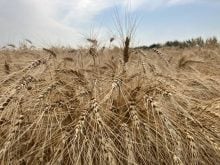MarketsFarm — As has often been the case, February 2020’s oilseed crush was lower than January’s, according to Statistics Canada’s latest report released Thursday.
More than 812,600 tonnes of canola were crushed in February, down 4.9 per cent from January. Also, there were 144,260 tonnes of soybeans crushed in February, for a drop of 10.7 per cent from January.
February’s canola crush produced nearly 352,270 tonnes of oil, along with about 442,420 tonnes of canola meal, down 6.1 per cent and 7.3 per cent respectively from January.
On a year-to-year basis, the February 2020 crush was 27.9 per cent greater than in February 2019. From that February 2019 crush came about 277,400 tonnes of oil and over 355,200 tonnes of meal.
Read Also

U.S. grains: Soy hits four-month high on hopes for China trade deal
U.S. soybean futures jumped to their highest level in more than four months on Monday on hopes that China will resume buying American supplies after President Donald Trump said the countries were set to reach a trade deal during his trip to Asia this week.
Over the last 10 years the February crush has been usually lower than in January. The one exception came in 2016, when about 710,300 tonnes of canola were processed that February compared to 683,800 the previous month.
The soybean crush in February produced nearly 26,260 tonnes of soyoil and more than 112,550 tonnes of soymeal. Respectively those figures were down 8.5 and 11 per cent from January.
In comparison to the February 2019 soybean crush, this February’s data showed about 144,260 tonnes were processed, for a 16.5 per cent decrease. The amount of soyoil fell 20.5 per cent to nearly 26,260 tonnes, and the amount of soymeal dropped almost 15.2 per cent at just over 112,550 tonnes.
The monthly record for the soybean crush was in December 2018 at 209,239 tonnes. That’s a good deal more than Statistics Canada’s first record soybean crush in August 1971 at 54,753 tonnes.
The largest single-month canola crush came this past December with 899,331 tonnes, which was a far cry from the agency’s initial recorded canola crush of 15,469 tonnes, also in August 1971.
— Glen Hallick reports for MarketsFarm from Winnipeg.













